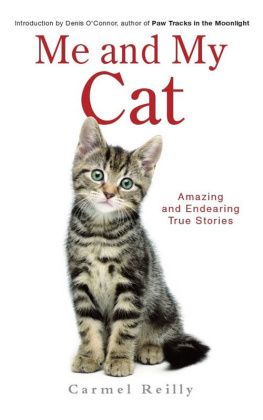A heartwarming collection of stories about the cats and the lives theyve touched around them, previously published in the anthology The Little Book of Puppy Love
Sometimes, animals come into our lives just when we need them most. In these true stories about the powerful connections between people and their cats, Jo Coudert and Jennifer Basye Sander uncover the simple joys of loving and being loved by our favorite feline companions.
In this book youll meet the lost cat who comforts a grieving woman, the orange tabby with psychic abilities, the purring kitten rescued from a freeway overpass, the litter of strays who made cat people out of their resistant owners, and many, many more.
These animals dont just bring us comfortthey save our lives. Coudert and Sander celebrate the everyday miracles that happen when we form bonds with animals.
This new edition combines charming stories into a perfect collection for anyone who melts at every kitty meow.
Praise for The Dog Who Healed a Family
These touching and engaging vignettes will make animal lovers out of us all.
Publishers Weekly
Great gifts for animal lovers, or anyone who wants to be reminded what a poignant, funny and enriching gift that animals are to the human spirit.
Tulsa World
Praise for The Dog with the Old Soul
Brimming with tears, laughter and love, The Dog with the Old Soul reminds us of the life-altering connection that animals can make in our lives.
Talkin Pets
The friendly, first-person presentations reflect wise, warm and compelling storytelling that captures both the combustible and complex feel of the human-animal bond.
Seattle Kennel Club
Jo Coudert was the author of nine books, including Seven Cats and the Art of Living. A lifelong animal lover, she lived in Califon, New Jersey.
Jennifer Basye Sander is the author and coauthor of over fifty titles, including the New York Times bestseller Christmas Miracles.
True Tales of Kitty Love
Jo Coudert
Jennifer Basye Sander

TABLE OF CONTENTS
by Jo Coudert
by Katherine Traci
by Maryellen Burns
by Trina Drotar
by Ed Goldman
by Chris Fowler
by Jennifer ONeill-Pickering
by Kathryn Canan
by Gordon M. Labuhn
AN EXPERIMENT IN LOVE
Jo Coudert
T he dog discovered them, four newborn kittens abandoned in tall grass beside the road. When Livy returned from her walk carrying the tiny creatures in the palm of her hand, Steve, her husband, ordered, Get those mice out of here. He was equally adamant when Livy showed him they were kittens. No more animals, he said firmly. Steve had already been saddled with Livys dog and three cats, and he was not used to a houseful of pets.
I wont keep them, Livy promised. Just until theyre old enough to be on their own. Steve looked dubious. Word of honor, Livy assured him, never dreaming how much she would come to regret that promise.
She made a warm nest for the babies by ripping up an old blue blanket and lining a wicker basket with it. Then she went to a nearby pet store to get advice about feeding them. You cant raise kittens that young, the storekeeper warned her, but Livy decided to buy a set of toy nursing bottles for dolls and try. She warmed milk and she and the kittens struggled through several false starts until the kittens got the hang of it and drank avidly.
Two hours later they woke and set up an insistent chorus of soft little cries to be fed again. And every two hours after that. Four times in the night Livy crawled out of bed to warm their milk, and in the morning she congratulated herself that they were looking just a little bit stronger, a little bit bigger.
But by afternoon her pleasure had turned to pessimism. The kittens intake was fine, but there was no outgo. Their little bellies were stretched tight as drums. Livy called everyone she could think of who might know what to do, but nobody had a suggestion. Hanging up after the last fruitless inquiry, she looked at the kittens sadly. So the storekeeper was right after all: she was not going to be able to save them. She picked up one of the kittens and began to rub its taut tummy in commiseration. Suddenly her hand was drenched. She picked up another kitten and rubbed its tummy. The same thing happened. Did a mother cat, after her kittens had nursed, give them a good rough washing? From then on, so did Livy, and the kittens thrived.
Steve, reporting on their progress to the people in his office, came home one evening with word that his secretary had offered to adopt Peaches, Livys favorite because of her lovely soft coloring. As though it were Peachess fault that she would soon be leaving her, Livy found herself picking up Peaches less often and making her wait her turn for the bottle instead of feeding her first. Idly she wondered if it would affect Peachess personality no longer to be treated as special. Then the thought turned itself around. Suppose she gave one of the kittens extra amounts of mothering? Suppose she held and cuddled and talked to it more? Would it grow up to be any different from its siblings? She decided it would be an interesting experiment.
She chose the most unpromising of the kittens as her subject. This was a little black one Steve called Bat Cat because he was so homely with his dull fur, squashed porcine face and little folded flaps of skin for ears. The runt of the litter, Bat Cat was always on the bottom of the kitten heap, the last to be picked up, the last to be fed, the one who got the least attention.
Livy gave the tiny creature a new nameBoston, short for Boston Blackieand repeated it softly over and over while she held him for his bottle. If he still seemed hungry after he finished one bottle, she gave him a second, and a third, as much as he wanted until, blissfully full, he fell asleep. Then she tucked him into her sweater so that he slept against her beating heart while she worked at her desk. When he woke, she snuffled his small body with her warm breath and talked to him before putting him back in the basket to play with his siblings.
The effect on the kitten was immediate. His newly opened eyes, which, like the others, had been vague and unfocused, became alert, and he studied Livys face with interest. Quickly he learned his name, and when Livy spoke it, he clambered over the folds of the blue blanket as fast as his unsteady little legs could carry him to her. Now when he was in the sleeping heap of kittens, no longer did he passively accept the bottom spot; sweetly but determinedly he wriggled out from under and nested himself on top. Was it that, sensing himself valued, Boston began to value himself?
He was the first of the kittens to discover he could purr, the first to make endearingly clumsy attempts to wash himself, the first to undertake the adventure of climbing out of the wicker basket. When the others, exhausted from their tumbling play, fell asleep, he climbed over the side of the basket and searched for Livy. Finding her, he struggled to sit up on his haunches and held out his front paws in a plea to be picked up. Unable to resist, Livy lifted the tiny body gently, turned him on his back and nuzzled the star-shaped sprinkling of white hairs on his tummy. After a moment his small paws reached up to pat her cheek and his bright eyes searched hers as he listened to the words she murmured.
Even Bostons looks changed. His fur, from being rusty and rough, grew sleek and shiny. At first the luster was just on his head, but gradually the glossiness moved down his entire body until little Boston gleamed from the tip of his nose to the tip of his tail. Though never beautiful, he became so alert and merry, so trusting and affectionate, that the mere sight of him was a delight. Obviously Livys experiment in love was an unqualified success, except for one large drawback: in giving Boston so much love, Livy had come to care deeply about him in return.













